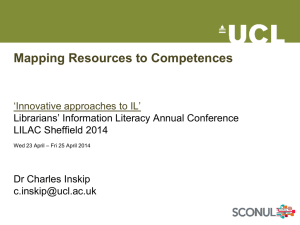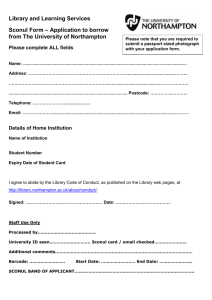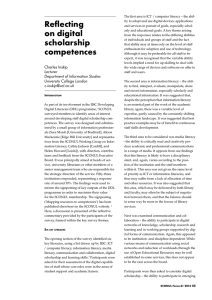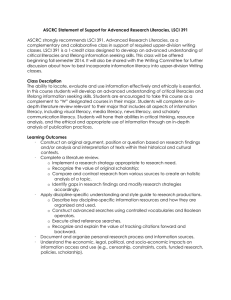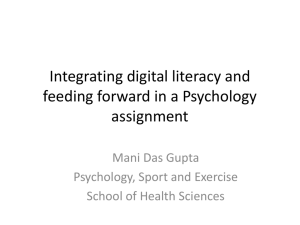Reflecting on digital scholarship competences :
advertisement
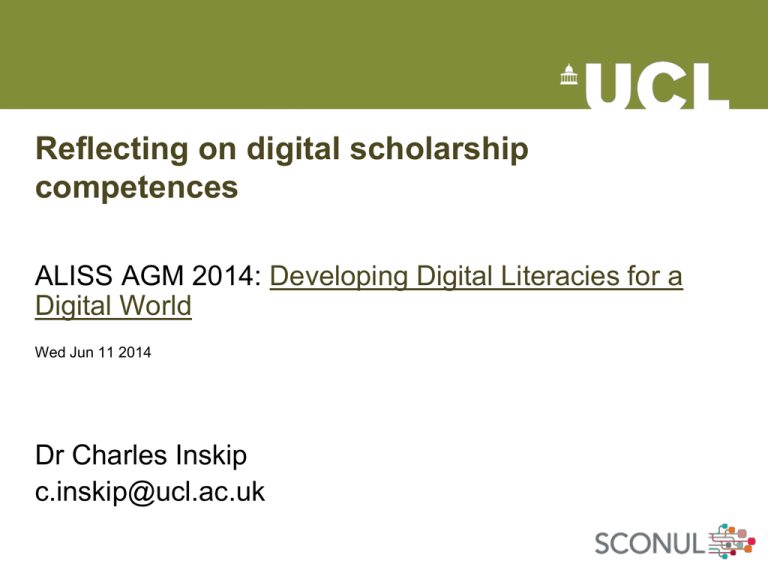
Reflecting on digital scholarship competences ALISS AGM 2014: Developing Digital Literacies for a Digital World Wed Jun 11 2014 Dr Charles Inskip c.inskip@ucl.ac.uk Context • This presentation summarises the findings of research reported in a paper, “Reflecting on digital scholarship competences” due for publication in SCONUL Focus in July 2014 • This work was funded by SCONUL through their participation in the JISC Developing Digital Literacies programme • It is part of a wider project, Research Information Literacy and Digital Scholarship (RILADS) which was funded by Research Information Network (RIN) and SCONUL. Baseline survey • As part of its involvement in the JISC Developing Digital Literacies (DDL) programme [1], SCONUL took a survey of members to identify areas of interest around developing staff digital scholarship competences. • The survey was designed and administered by a small group of information professionals (Sara Marsh ( University of Bradford); Alison Mackenzie (Edge Hill University) and representatives from the SCONUL Working group on Information Literacy, Cathie Jackson (Cardiff); Helen Howard (Leeds)), with direction, contributions and feedback from the SCONUL Executive Board. [2] Baseline survey • The survey was principally aimed at heads of service, university librarians or other members of a senior management team who are responsible for the strategic direction of the service. 53 institutions responded representing a response rate of around 30%. [2] • The findings were used to inform the signposting of key outputs of the DDL programme in order to maximise the value of these outputs for the SCONUL membership. • The signposting (‘Mapping Resources to Competences’ [3]) has been published elsewhere on the SCONUL website. • Here, a discussion is presented of the reflective commentary provided by the participants of the survey, framed within the key survey themes. Six key literacies • The opening section of the survey identified six key literacies, using a list drawn up by JISC [4]: – – – – – – ICT / computer literacy, information literacy, media literacy, communication and collaboration, digital scholarship learning skills. • Participants were asked for their assessment of the digital capabilities of staff whose core roles were in the areas of student support and academic liaison. Key issues • Policy, strategic development and organizational change, • networks and collaborations, • good practice case studies and • continuing professional development frameworks ICT/computer literacy “the ability to adopt and use digital devices, applications and services in pursuit of goals, especially scholarly and educational goals” Staff expertise Importance of staff developing expertise in this area 0.00% 4.2% 18.8% 77.1% 8.3% 2.1% 0.0% Expert Essential Competence Not a current priority Novice N/A 89.6% Maybe in the future Not required [2] ICT/computer literacy “very variable between different individuals and groups of staff” “levels of competence often rely on individual's enthusiasm for technology” “preference is for all staff to be expert, but this is not currently the case for those on lower grades” “need to upskill staff so that they can deal with more and more devices and software” Information literacy “the ability to find, interpret, evaluate, manipulate, share and record information, especially scholarly and educational information” [2] Information literacy “traditional library function” “some staff are experts, however, there is a lack of consistency of expertise” “to develop skills as the information landscape changes” “keeping up to date with best practice” “staff are expert but some are probably at novice so there is currently quite a mix” “continuous development is essential” Media literacy “the ability to critically read and creatively produce academic and professional communications in a range of media” Staff expertise 2.1% 8.3% Expert 8.3% Competence 54.2% 35.4% Novice 35.4% 54.2% N/A 2.10% Importance of staff developing expertise in this area 4 26Expert 17Competent 1Novice N/A 0.0% 16.7% Essential 14.6% Not a current priority Maybe in the future 68.8% Not required 68.8% 14.6% Essential 16.7% Not a current priority 0.0% Maybe in the future Not required [2] Media literacy “depends on institutional position” “depends on discipline” “this is an area I see as important but due to other work needing to take place it won't be prioritised” “I am not sure we have time to improve media literacy, although I foresee a strong need in the near future” “library staff are not heavily involved in developing staff and students media literacy capabilities, especially in the terms of creation of material, although some staff do have these skills and help when asked.” “need to address balance of which skills should be provided by librarians and which by academics (or both). I would like to see this balance shift towards librarians.” Communication and collaboration “the ability to participate in digital networks of knowledge, scholarship, research and learning and in working groups supported by digital forms of communication” Staff expertise Importance of staff developing expertise in this area 2.1% 14.6% 0.0% Expert 35.4% 50.0% Competent Novice N/A 6.2% Essential 10.4% Not a current priority 81.2% Maybe in the future Not required [2] Communication and collaboration “depends on institutional position” “an area for development” “a need for more communication and collaboration in order to reduce workloads and share re-use content being produced” “necessary for sharing information in ways that learners want to see it” “well established in Academic Liaison and Learning Development Teams, Facebook, blogs, ning, twitter and other social media based collaboration” Digital scholarship “the ability to participate in emerging academic, professional and research practices that depend on digital systems” Staff expertise Importance of staff developing expertise in this area 0.0% 12.5% 8.3% Expert 43.8% 47.9% 0.0% 10.4% Essential Competent Novice N/A Not a current priority 77.1% Maybe in the future Not required [2] Digital scholarship [4] Digital scholarship “an area of growing importance for us” “not well understood or relevant to some student support” “emerging field but important to develop especially for staff support” “pockets of good practice in the service” “in the core roles with student support and academic liaison. Some knowledge sharing is needed” “librarians and learning technologists have an expert awareness” “[may not] have all the tools required to repurpose digital material” Learning skills “the ability to study and learn effectively in technology-rich environments, formal and informal” Staff expertise Importance of staff developing expertise in this area 0.0% Expert 20.8% Competence18.8% 20.8% 60.4% Novice 18.8% N/A 0.00% 60.4% 10 29Expert 9Competent 0 Novice Essential0.0% 10.4% Not a current priority 18.8% Maybe in the future Not required 70.8% Essential Not a current priority Maybe in the future N/A Not required [2] Learning skills “again a lot of work is needed here - while there is some knowledge there is not enough. Staff need to be broader in their outlook than they currently are” “several staff have teaching qualifications, so again, a big range of expertise” “not a priority but useful to have” “for our Learning skills staff” “the range of expertise varies across these roles. E-Learning advisers and Academic Learning advisers are competent and experts in this field, Academic Librarians range from Competent to Novice, Learning Advisers are novices” Digital literacy lens on the seven pillars [5] The digital literacy lens of the Seven Pillars “the lens is a very useful tool to measure staff competencies in the first instance particularly academic liaison librarians. It will also enable the Service to map and evaluate its information and digital literacy teaching” “skilled at using technology for administration and management as well” “all Library staff (well most probably the vast majority university staff who support student learning) should have the understanding and skills listed in the lens” “keeping practice and therefore the lens up to date as technologies develop will be key to ensuring the usefulness of it as a tool to staff & managers” “thought it is more describing the capabilities of our end-users rather than our staff” “staff can't be expert in all areas” “different grades of staff do have different levels of understanding and skills”. The digital literacy lens of the Seven Pillars “Ongoing information, training and development opportunities for groups of staff” “a small team of digital skills supporters … supported by the centre for development of L&T” “internal & external training” “identifying in-house, free, and low-cost courses for skilling up staff.” “appraisals leading to individual action plans (with) external events and peer supported activity” “strategic changes to the student curriculum” “trialling iPads” “involvement of the academic liaison librarians in the selection, implementation and promotion of digital resources and content; on the job experience of using digital tools” “Technology Enhanced Learning team (who) are developing skills by using and promoting Blackboard (etc)” More valuable ideas can be read by accessing the comments document [6] in full via the JISC Design Studio. Institutional perspectives “mostly ad hoc and largely dependent on personal contacts” “trying to maximise usage of library staff as leaders in this area but is slow work as current academic can be reluctant to change practices” “part of the Libraries Business Plan but also an informal commitment on the part of Academic Development” “included in cross university working groups” “approval of the inclusion of digital literacy in every programme achieved by agreeing this through formal channels University Teaching and Learning Committee, embedded in academic guidelines for programme validation and review” “a new Teaching and Learning Strategy in which digital literacy is a key priority” “LLS Director is working closely with Director of LT and other senior colleagues on the development of a new Learning and Teaching strategy for the university” “the service is working jointly with another university department to develop the institution's strategic position” “other key service providers e.g. Careers, e-learning team, academic support office etc.” “further work to be done to embed this in university priorities, not seen as a current priority compared with other issues, though some academic staff are on board” Key issues • Policy, strategic development and organizational change, • Networks and collaborations, • Good practice case studies and • Continuing professional development frameworks The evidence is clear • SCONUL members are aware of the issues around continuing staff development around all forms of literacies. • They are working across sectors and departments. • They are ensuring the voice of the library is heard in the constantly changing strategic education landscape. • Although the detail of individual experiences may vary according to the particular context of that organization, and some may be further down the road than others, it is important to continue these conversations. Acknowledgements • The research could not have taken place without the detailed contributions of the participants, who generously shared their time and their experiences. • The survey was designed and administered by a small group of information professionals (Sara Marsh ( University of Bradford); Alison Mackenzie (Edge Hill University) and representatives from the SCONUL Working group on Information Literacy, Cathie Jackson (Cardiff); Helen Howard (Leeds)), with direction, contributions and feedback from the SCONUL Executive Board. • This work was funded by SCONUL through their participation in the JISC Developing Digital Literacies programme • It is part of a wider project, Research Information Literacy and Digital Scholarship (RILADS) which was funded by Research Information Network (RIN) and SCONUL. • The opinions expressed in this presentation and associated outputs are those of the author and may differ from SCONUL policy References 1. 2. 3. 4. 5. 6. JISC (2013) Developing Digital Literacies, available online at http://jiscdesignstudio.pbworks.com/w/page/46421608/Developing%20digital%20literacies [accessed 11 Jun 2014] Mackenzie, A. (2012) SCONUL: Summary report on baseline survey of digital literacy; January 2012, available online at http://jiscdesignstudio.pbworks.com/w/file/fetch/66781051/SCONUL%20Baseline%20summary.pdf [accessed 11 Jun 2014] Inskip. C. (2013) Mapping Resources to Competencies: a quick guide to the JISC Developing Digital Literacies resources, available online at http://www.sconul.ac.uk/publication/mapping-resources-tocompetencies [accessed 11 Jun 2014] JISC (2011) Developing Digital Literacies: Briefing Paper in support of JISC Grant Funding 4/11, available online at http://www.jisc.ac.uk/media/documents/funding/2011/04/Briefingpaper.pdf [accessed 11 Jun 2014] SCONUL (2013) The SCONUL 7 Pillars of Information Literacy through a Digital Literacy ‘lens’, available online at http://www.sconul.ac.uk/publication/digital-literacy-lens [accessed 11 Jun 2014] SCONUL (2013) Reflections on developing information literacies and digital scholarship in academic library staff, available online at http://jiscdesignstudio.pbworks.com/w/file/fetch/70361585/SCONUL_survey-comments.pdf [accessed 11 Jun 2014]
